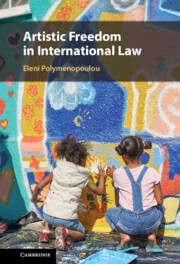Book contents
- Artistic Freedom in International Law
- Artistic Freedom in International Law
- Copyright page
- Contents
- Acknowledgements
- Table of Cases
- Introduction
- 1 Defining Art
- 2 The Nature, Scope and Protection of Artistic Freedom
- 3 Censorship and Restrictions
- 4 Positive Obligations in Relation to Artistic Freedom
- 5 Street Art, Graffiti and Art in Public Space
- 6 Public Morality, Obscenity and the Arts
- 7 Blasphemous Paintings, Cartoons and Other Religiously Offensive Art
- Index
6 - Public Morality, Obscenity and the Arts
Published online by Cambridge University Press: 06 April 2023
- Artistic Freedom in International Law
- Artistic Freedom in International Law
- Copyright page
- Contents
- Acknowledgements
- Table of Cases
- Introduction
- 1 Defining Art
- 2 The Nature, Scope and Protection of Artistic Freedom
- 3 Censorship and Restrictions
- 4 Positive Obligations in Relation to Artistic Freedom
- 5 Street Art, Graffiti and Art in Public Space
- 6 Public Morality, Obscenity and the Arts
- 7 Blasphemous Paintings, Cartoons and Other Religiously Offensive Art
- Index
Summary
The chapter discusses cultural and legal varieties in the definitions of ‘indecent’ and ‘immoral’ arts, as well as the varieties in our understanding of ‘obscenity’. It questions the existence of a universal standard of morality, pointing to the influence of the Platonic perception of art on UNESCO and other UN bodies and agencies. The chapter discusses two hard cases as case studies: first, extremist contemporary visual arts and performances such as those involving bodily harm and the so-called cadaver art, and second, child pornoraphy, specifically in the Japanese manga tradition and the particular genre of Lolicons. The legal challenges arising therein are largely premised on a discussion of the contextuality of moral considerations (as evidenced for instance in temporal and regional varieties and the variations of the ‘average person’ standard in domestic jurisdictions, including even in the acceptance of the artistic genre of the nude in painting and sculpture ). In international law this debate is translated into a lack of consensus in defining universal standards and an extraordinary variety of domestic standards (for instance, in relation to the ‘average person’ morality standards), which allows for broader State discretion.
Keywords
- Type
- Chapter
- Information
- Artistic Freedom in International Law , pp. 159 - 189Publisher: Cambridge University PressPrint publication year: 2023

